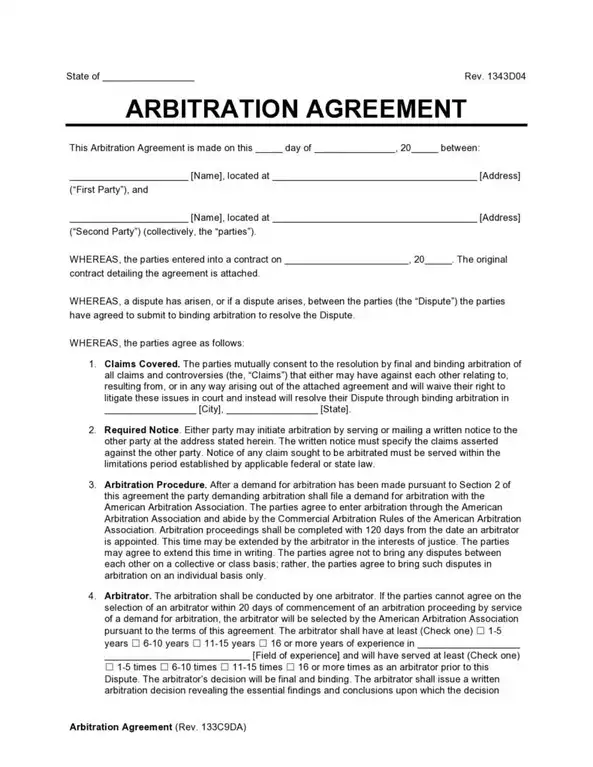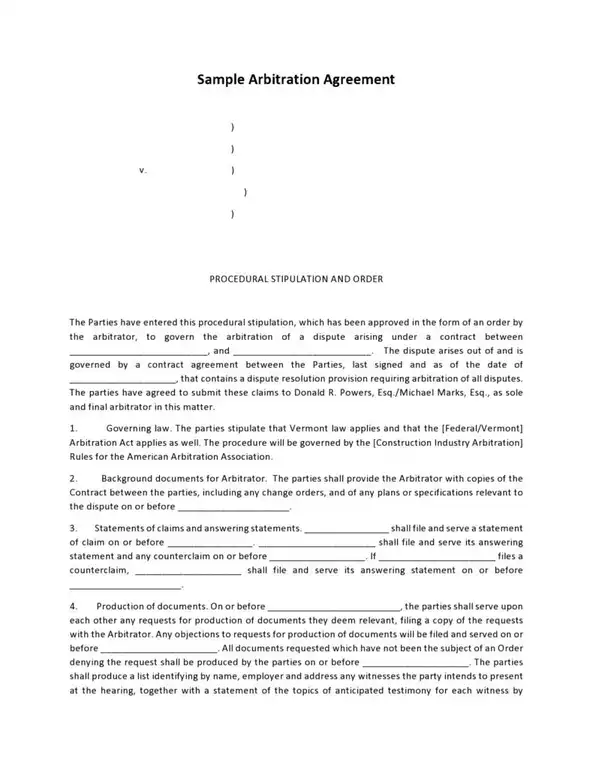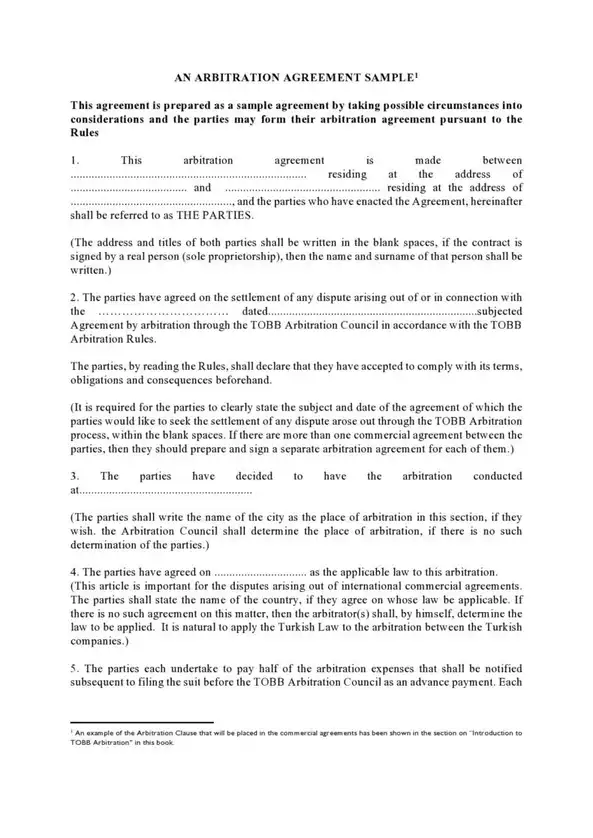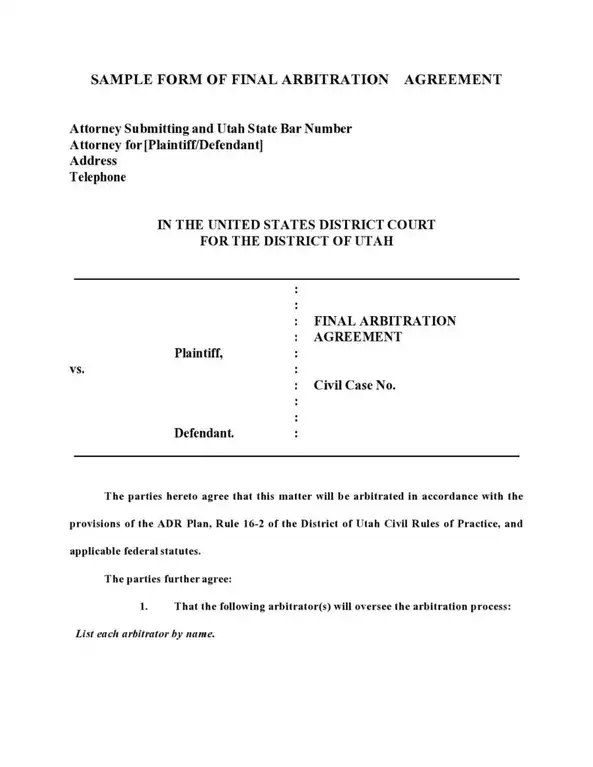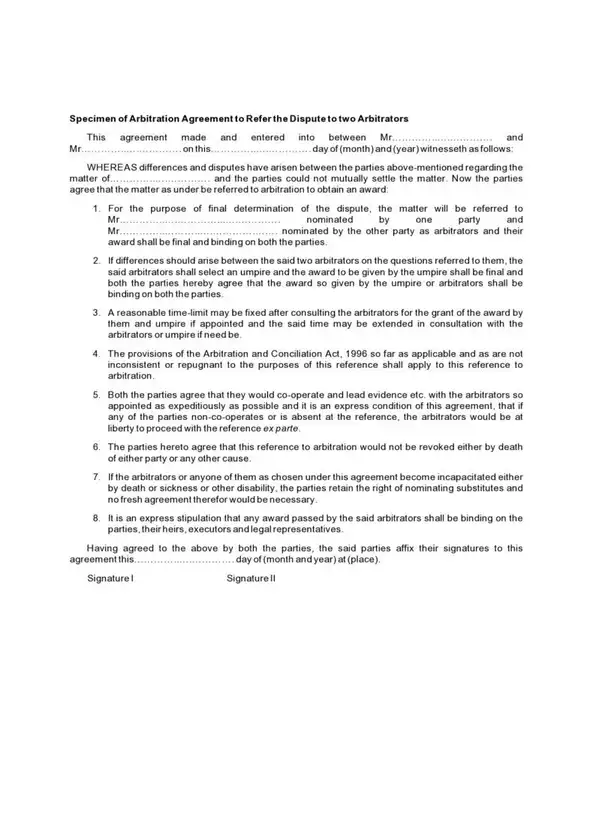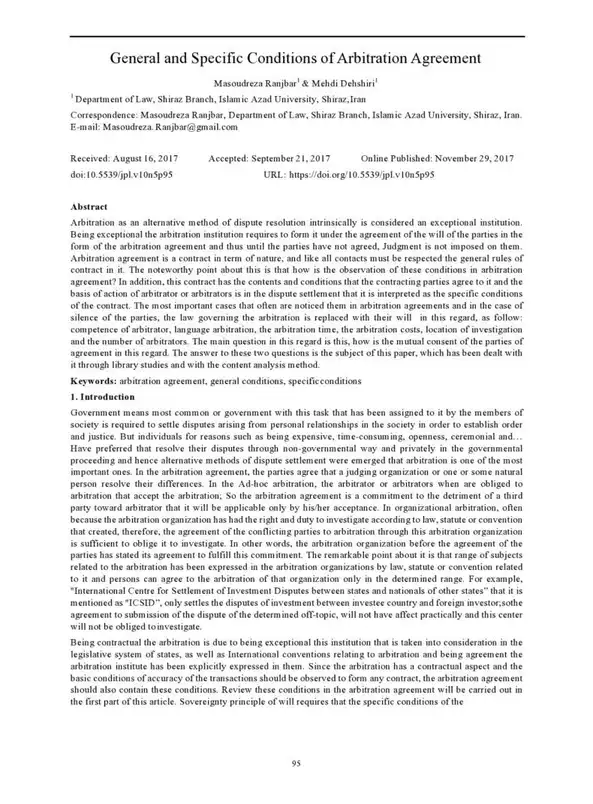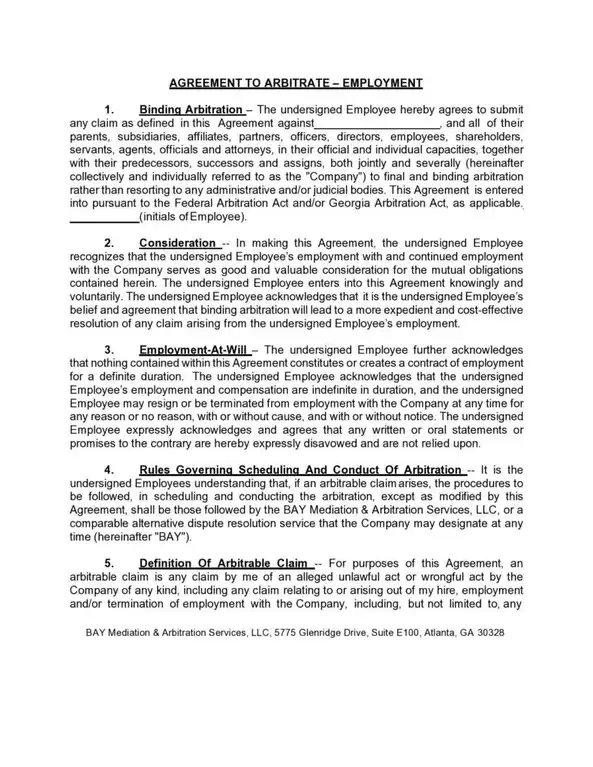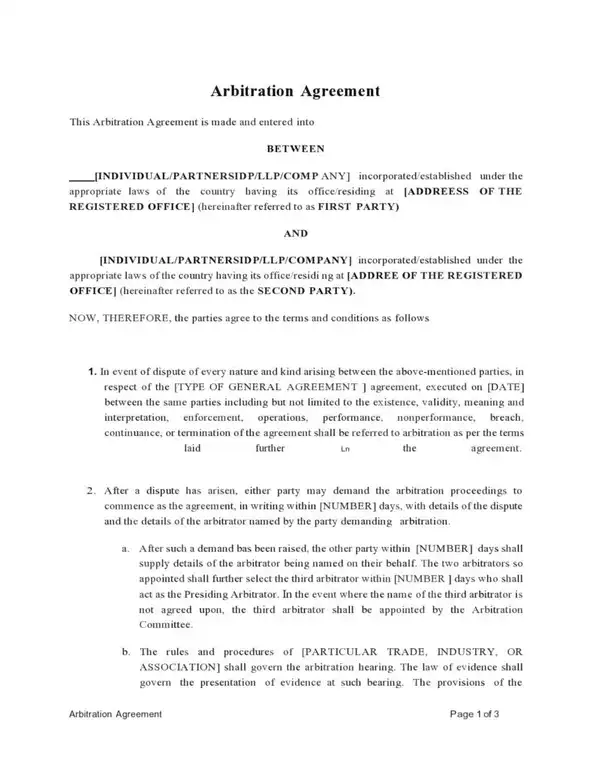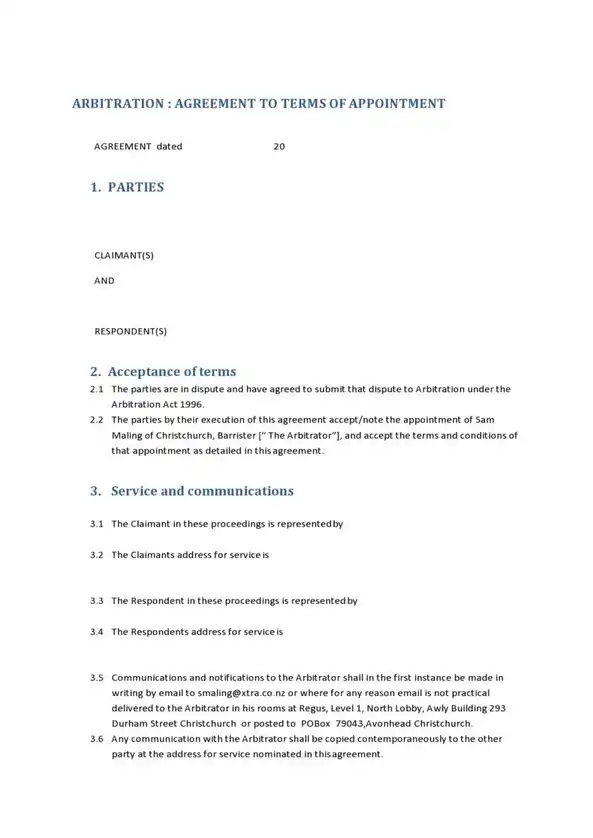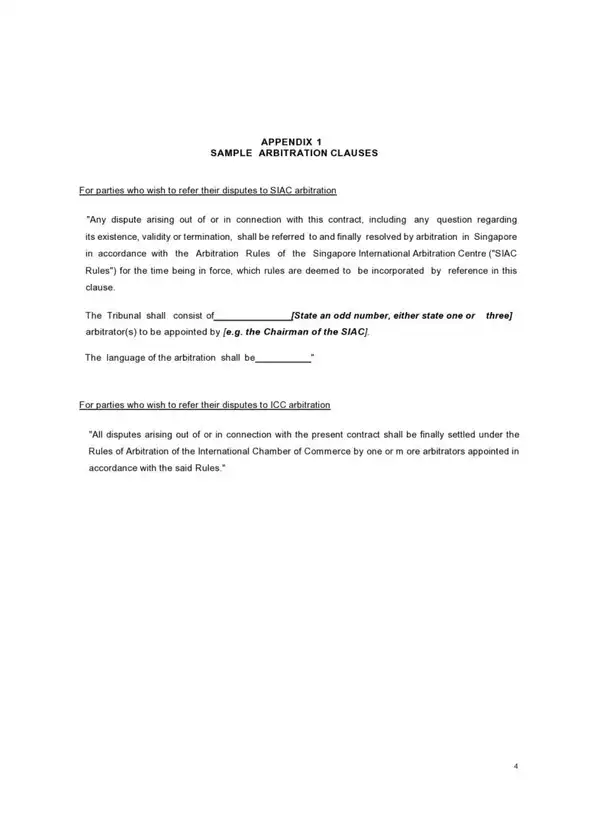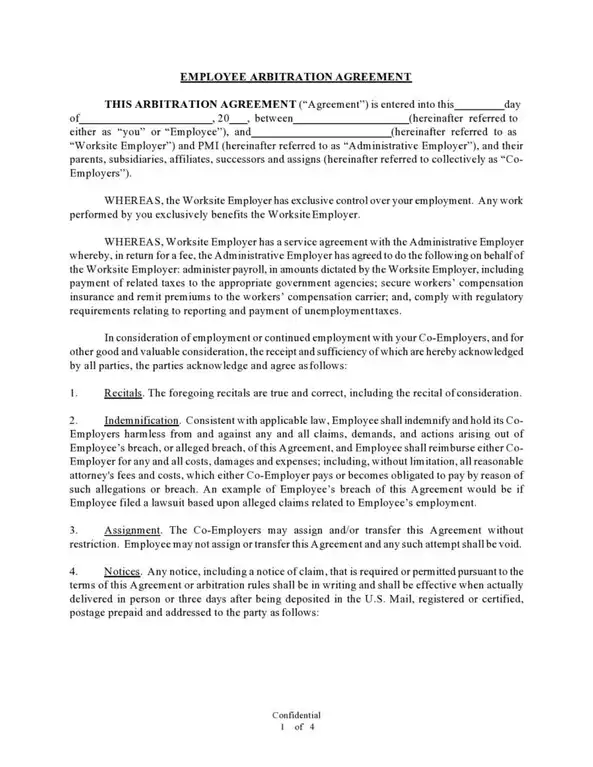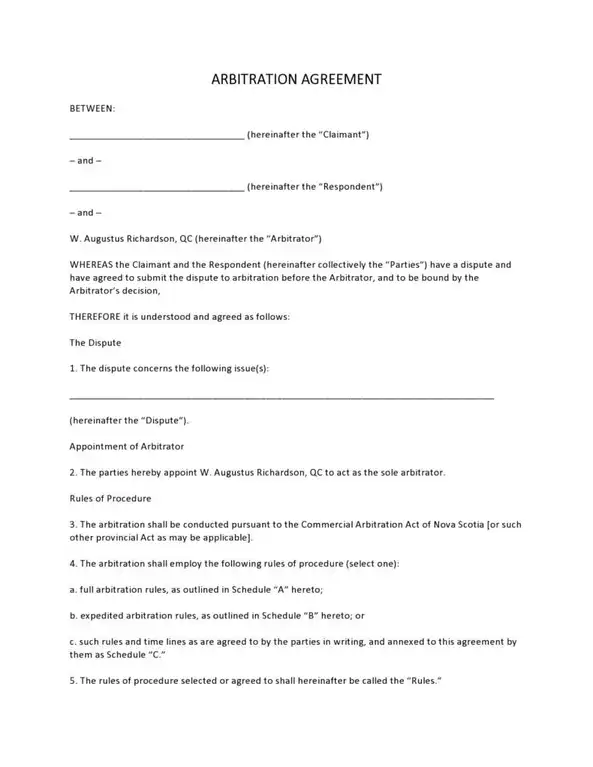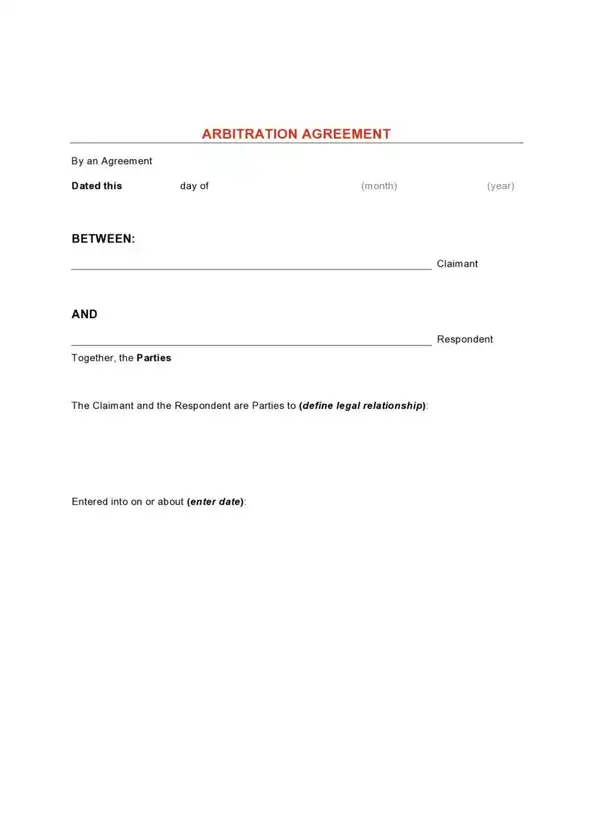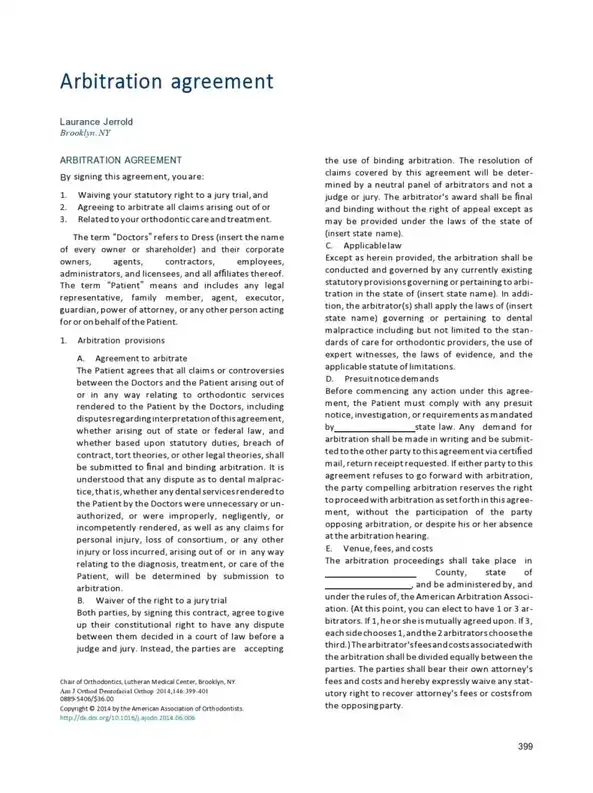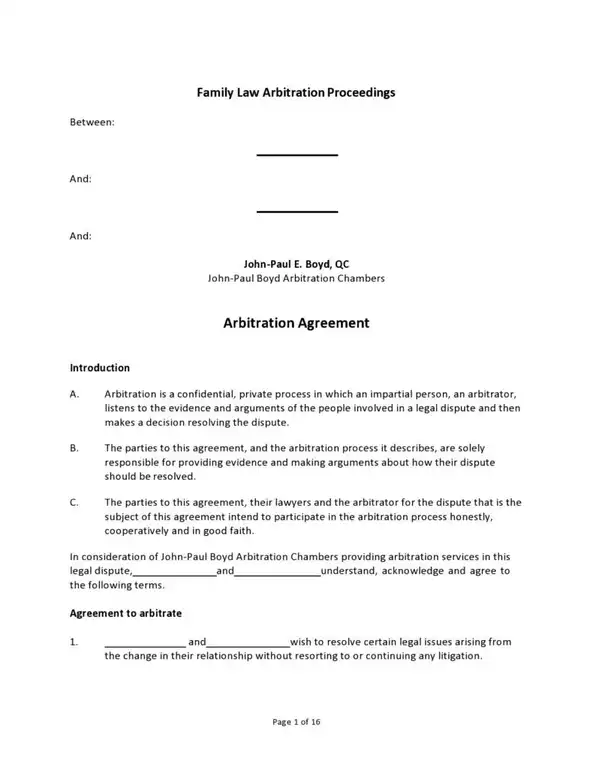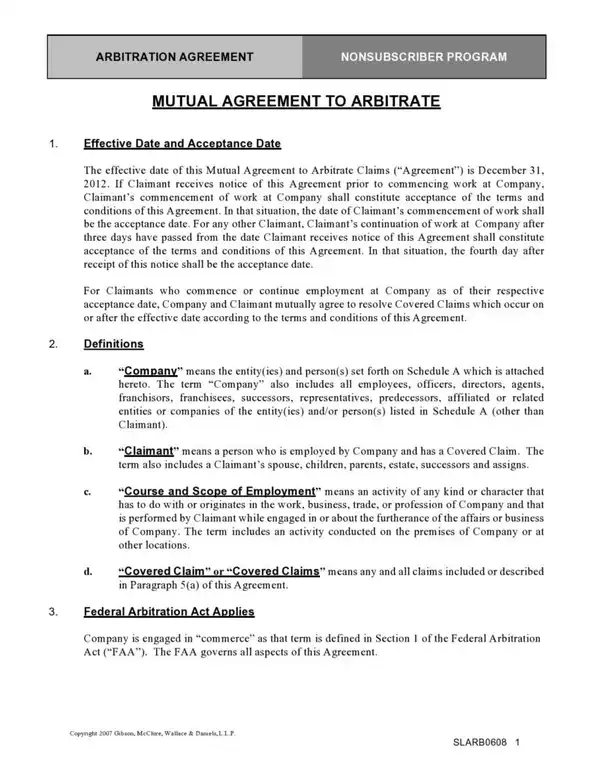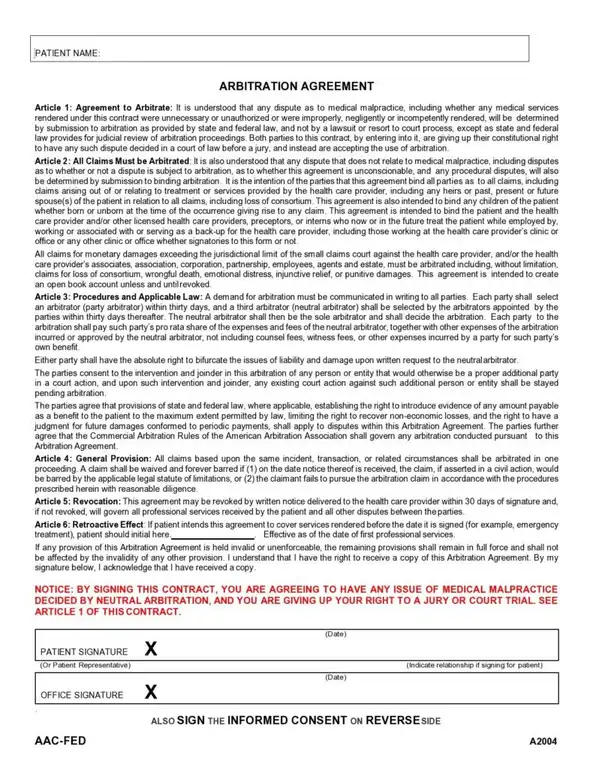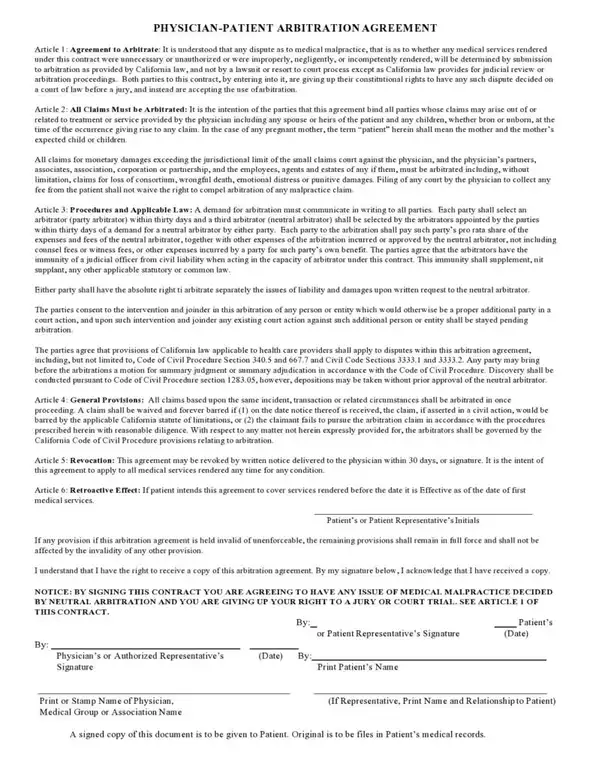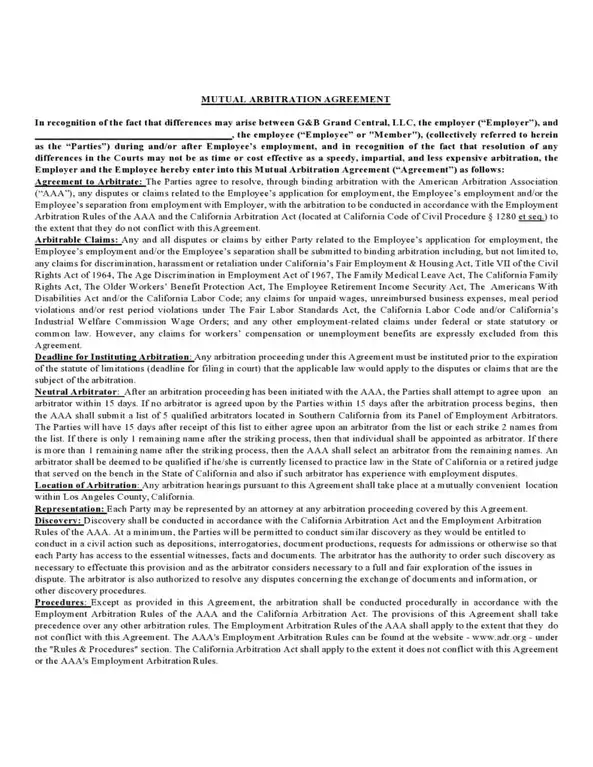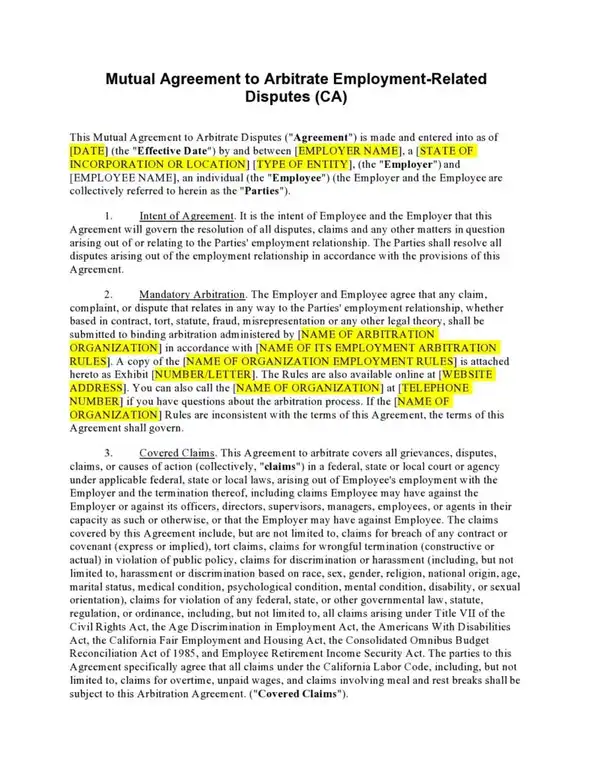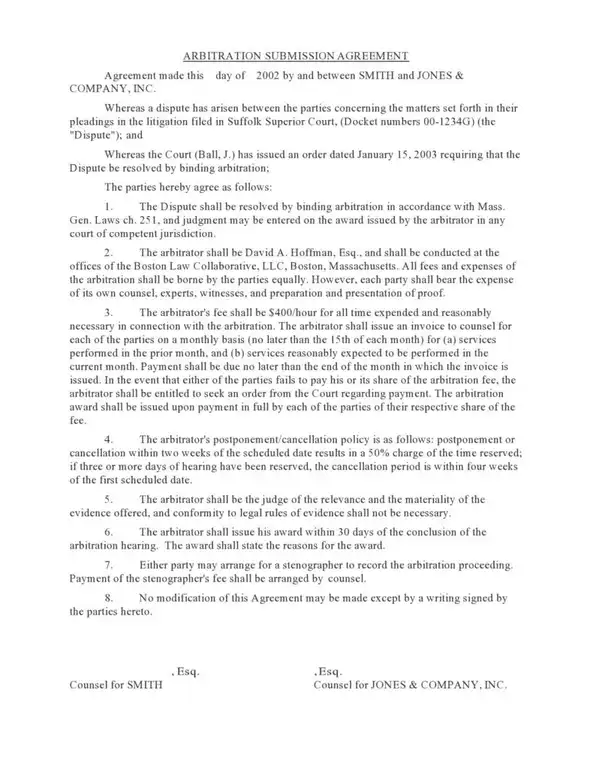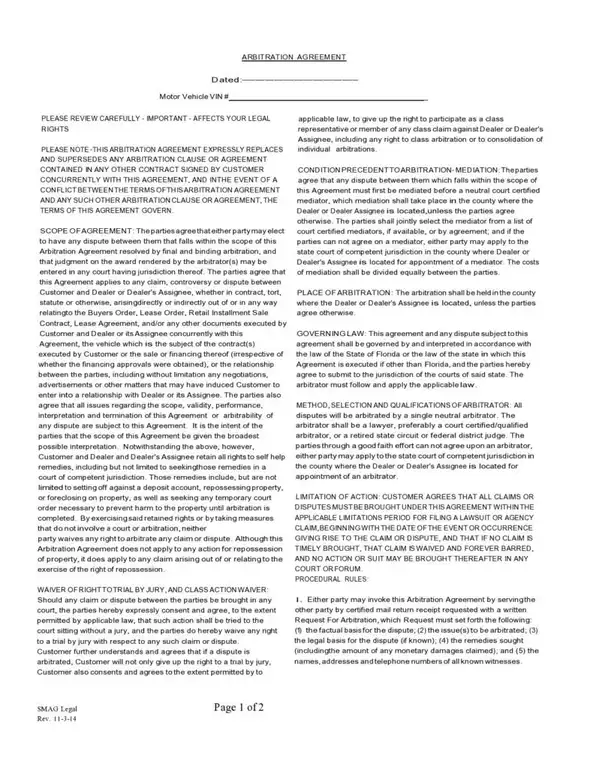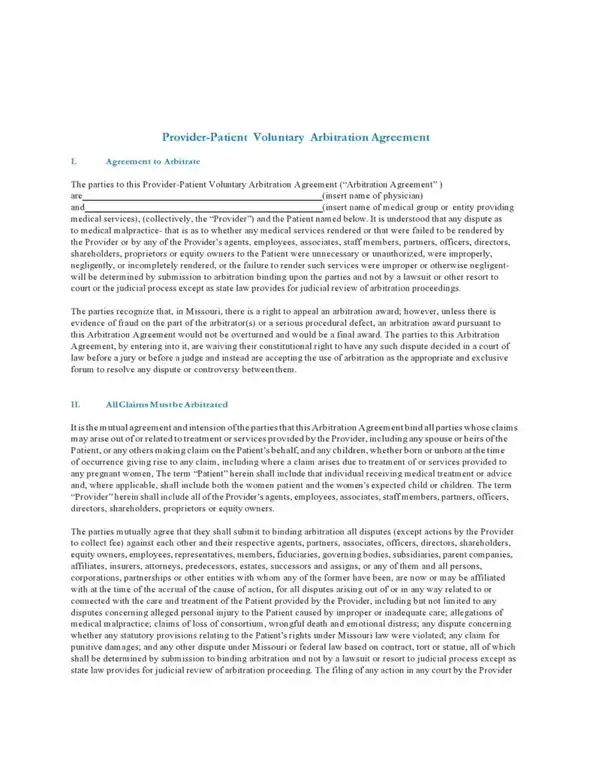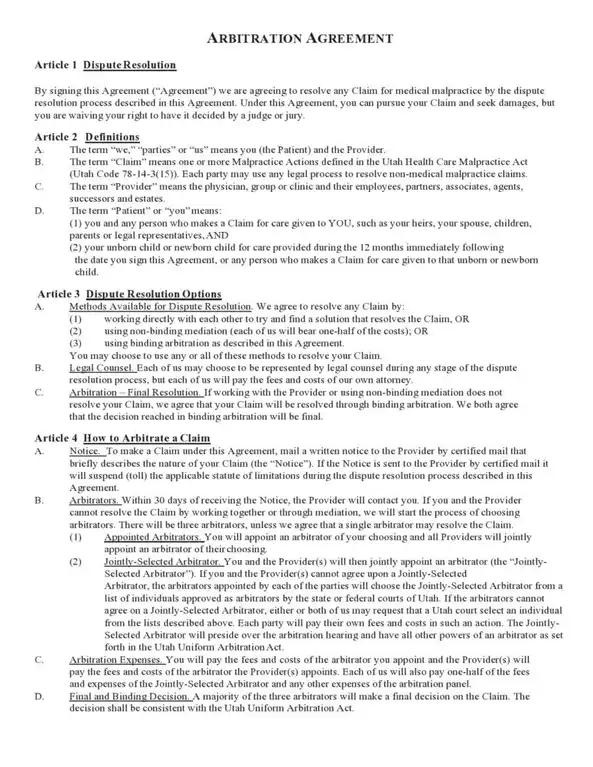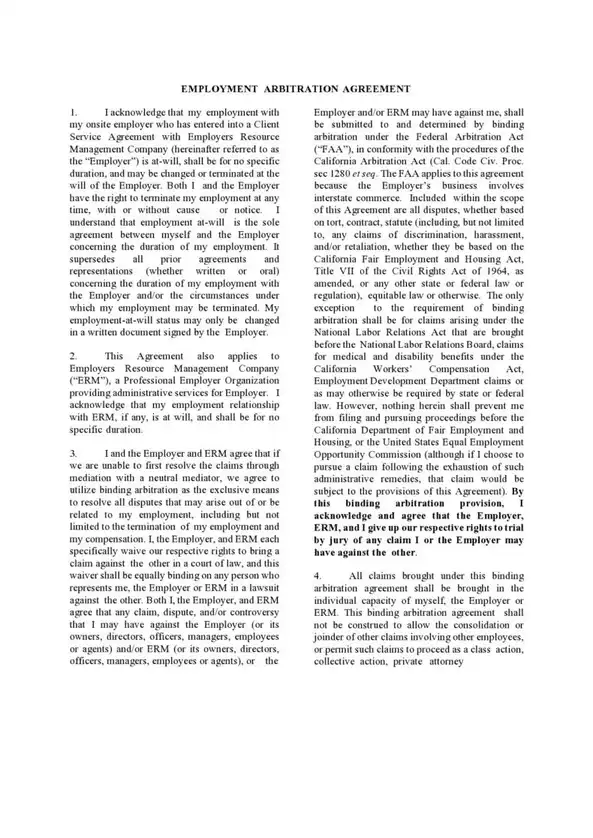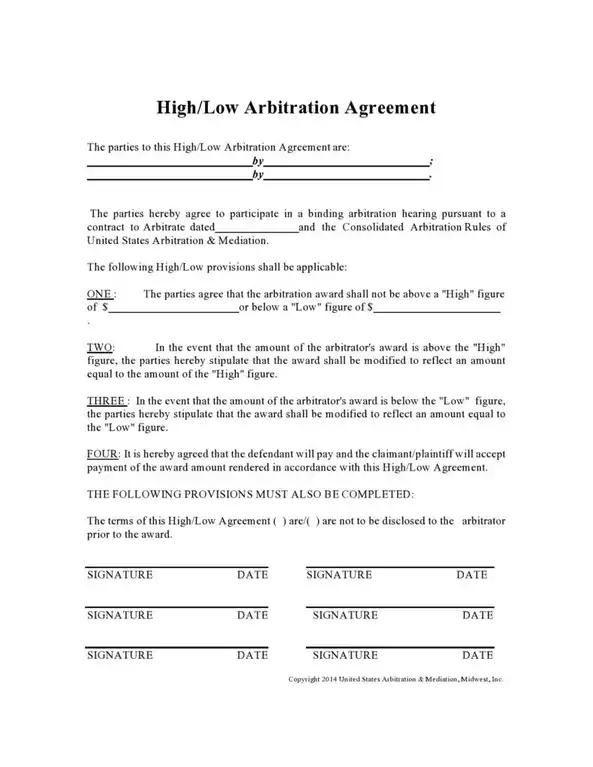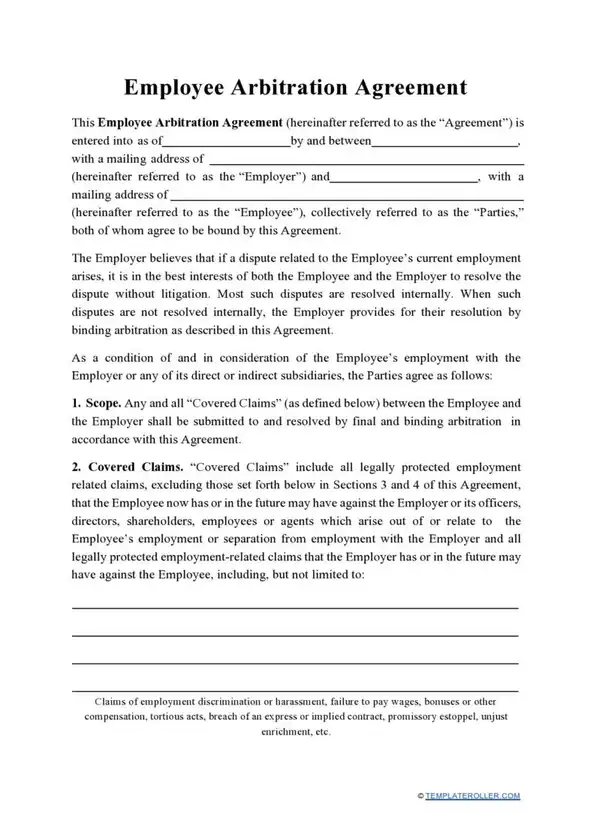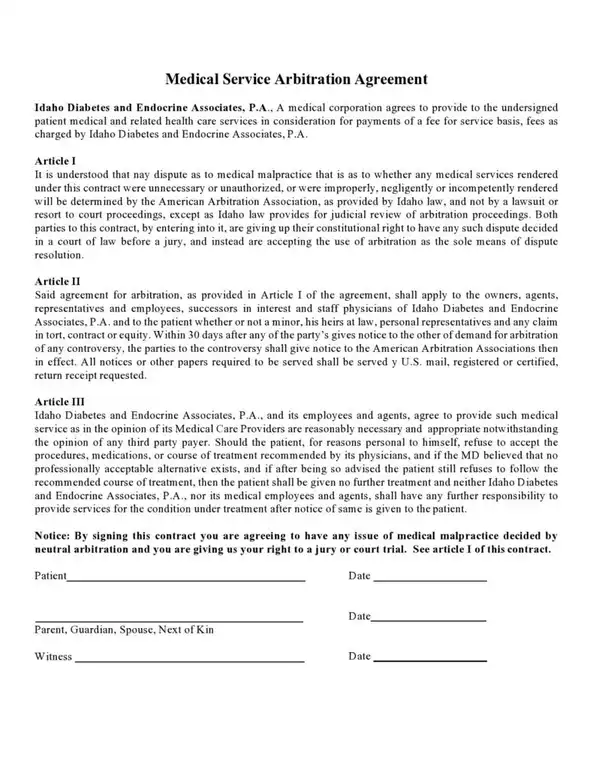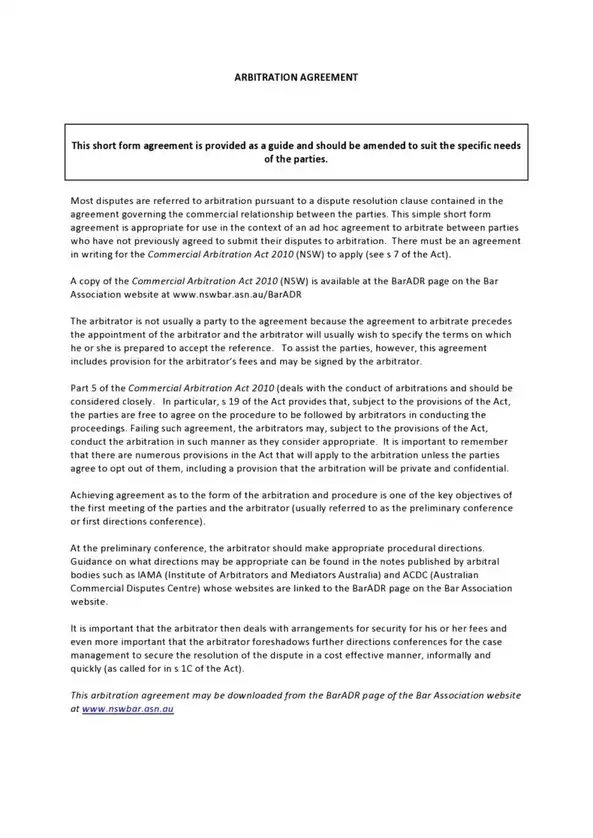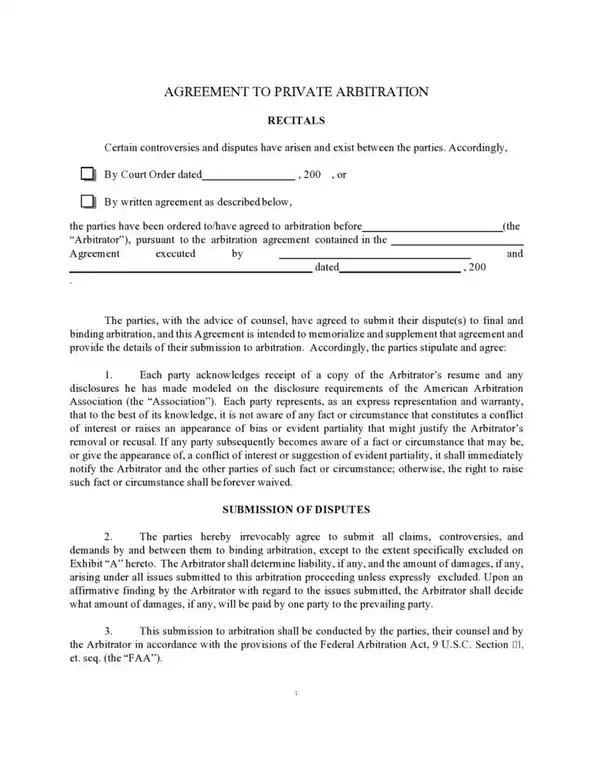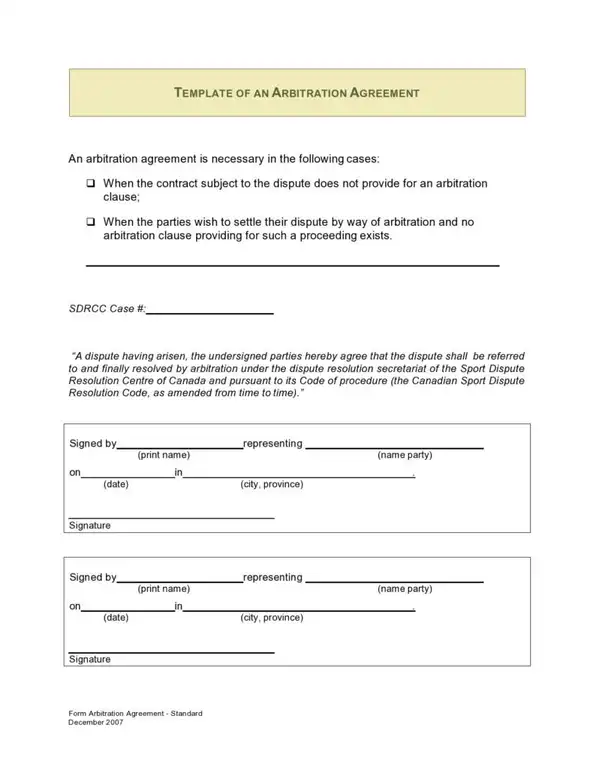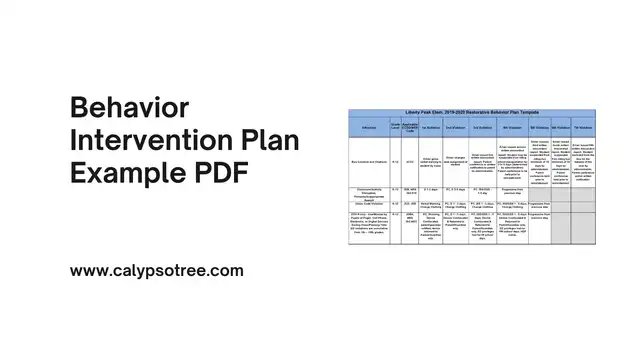What is an arbitration agreement? It is a written contract in which two or more parties agree to settle a dispute outside of court through arbitration. This method is often preferred because it is fast, private, and usually costs less than going to court.
Arbitration Agreement
What Does an Arbitration Agreement Include?
Let’s break it down. key parts of an arbitration agreement
Arbitration Clause
This is a part of the contract that says any disputes will be resolved through arbitration instead of going to court.
Scope of Arbitration
This section explains what kinds of disputes will be handled through arbitration. It can cover things like business disagreements, employment issues, or consumer complaints.
Selection of Arbitrator
This part describes how the arbitrator will be chosen. The parties might agree to choose someone together, or an arbitration organization might appoint one.
Arbitration Rules
Here, the agreement sets out the rules for the arbitration process. It could follow the rules of an arbitration organization, or the parties might agree on their own rules.
Location and Language
This section states where the arbitration will take place and what language will be used during the process.
Confidentiality
The agreement should include a confidentiality clause to keep the arbitration process and results private.
Costs and Fees
This part explains how the costs of arbitration, including the arbitrator’s fees, will be divided between the parties.
Binding Decision
This section states that the arbitrator’s decision is final and must be followed by both parties.
Types of Disputes Resolved Through Arbitration
Here are some common types of disputes that can be resolved through arbitration.
Commercial Disputes
- Business Disagreements: When two businesses disagree over a contract, they can use arbitration to find a solution. This is often faster and cheaper than going to court.
- Partnership Conflicts: If business partners cannot agree on something, they can turn to an arbitrator to help settle the matter.
Employment Disputes
- Workplace Issues: Employees and employers can use arbitration to resolve conflicts, such as disputes over wages, working conditions, or unfair treatment.
- Contract Disputes: Sometimes, there are disagreements about what an employment contract means. Arbitration can help interpret and settle these disputes.
Consumer Arbitration
- Customer Complaints: If a customer has a problem with a product or service, they can use arbitration to resolve the issue without going to court.
- Service Agreements: Disputes between a service provider and a customer can also be settled through arbitration.
Arbitration helps parties find a resolution in a private, efficient, and cost-effective manner.
Benefits of an Arbitration Agreement
Arbitration agreements offer several advantages over traditional court proceedings. Here are some key benefits of choosing arbitration.
Faster Resolution
- Quick Decisions: Arbitration is usually faster than court trials. This is because it has fewer formalities and a simpler process.
- Less Waiting Time: Parties do not have to wait long for a court date, which means disputes can be resolved more quickly.
Cost-Effective
- Lower Costs: Arbitration often costs less than going to court. There are fewer legal fees and less time spent in proceedings.
- Reduced Expenses: Since arbitration is faster, it also means less money spent on lawyers and other costs associated with long trials.
Confidentiality
- Private Process: Arbitration hearings are private, unlike court trials, which are usually public. This means that the details of the dispute and the final decision are kept confidential.
- Protects Reputation: For businesses, this privacy can help protect their reputation, as sensitive information is not disclosed to the public.
Flexibility
- Customizable Process: Parties can agree on the rules and procedures that will be used in arbitration, making it a more flexible process than court litigation.
- Choice of Arbitrator: Parties can choose an arbitrator who has expertise in the specific area of the dispute, ensuring a knowledgeable decision-maker.
Binding Decisions
- Final and Binding: The arbitrator’s decision is usually final and binding, which means both parties must follow it. This can bring a clear and definite end to the dispute.
- Enforceable: Arbitration awards are enforceable by law, meaning that if one party does not comply, the other party can sue to enforce the decision.
Arbitration Letters
written documents used to communicate decisions, requests, or agreements in the arbitration process. They ensure all parties have a clear record of the arbitration proceedings.
Enforceability of Arbitration Agreements
Arbitration agreements are legal contracts that both parties must follow.
Legal Enforceability
- Binding Agreement: When two parties sign an arbitration agreement, they agree to settle their disputes through arbitration. This means they cannot go to court for those disputes.
- Court Support: If one party refuses to arbitrate, the other party can ask a court to enforce the agreement. The court can make the refusing party go to arbitration.
Arbitrator’s Decision
- Final and Binding: The decision made by the arbitrator is final and must be followed by both parties. This is called a binding decision.
- Limited Appeals: There are usually very few chances to appeal or change the arbitrator’s decision, which makes the process quicker and more certain.
Legal Consequences
- Non-Compliance: If a party does not follow the arbitrator’s decision, the other party can ask a court to enforce it.
- Penalties: Failure to follow the arbitration decision can result in legal penalties, such as fines or other court orders.
Arbitration agreements are legally enforceable. Courts support these agreements and ensure that parties follow the arbitrator’s decision, making arbitration a reliable way to resolve disputes.
Arbitration Agreement Templates
Drawbacks of Arbitration Agreements
While arbitration has many benefits, it also has some drawbacks. Here are some of the main disadvantages.
Limited Appeal Options
- Few Appeals: One of the biggest drawbacks is that there are very few ways to appeal or change the arbitrator’s decision. If a party disagrees with the decision, they usually have to accept it.
- Final Decisions: The finality of arbitration decisions can be a problem if a mistake is made or if new evidence comes up after the decision.
Costs
- Arbitrator Fees: While arbitration can be cheaper than going to court, it can still be expensive. The fees for hiring an arbitrator can be high, especially for complex disputes.
- Additional Costs: Other costs may also apply, such as fees for renting a venue for the arbitration hearing.
Lack of Transparency
- Private Process: Arbitration hearings are private, which means there is less transparency. This can be a disadvantage if one party feels the process is unfair.
- No Public Record: Because arbitration is private, there is no public record of the proceedings or the decision.
Potential Bias
- Arbitrator Bias: Sometimes, there is a concern that an arbitrator might be biased, especially if they are chosen by one of the parties. This can affect the fairness of the decision.
- Repeat Arbitrators: If an arbitrator is frequently chosen by one party, they might favor that party to secure future work. This can create a conflict of interest.
While arbitration has many benefits, it is important to consider its drawbacks. Understanding these disadvantages can help parties make better decisions about dispute resolution.
Choosing an Arbitrator
Choosing the right arbitrator is very important for a fair and smooth arbitration process. An arbitrator is a neutral person who helps resolve the dispute. Here’s how to choose an arbitrator.
Selection Process
- Mutual Agreement: Both parties should agree on who will be the arbitrator. This ensures that both sides trust the chosen person.
- Arbitration Organization: If parties cannot agree, an arbitration organization, like the American Arbitration Association, can appoint an arbitrator.
Qualifications
- Experience: The arbitrator should have experience in the dispute area. For example, if the dispute concerns a construction contract, an arbitrator with knowledge of construction laws would be ideal.
- Impartiality: The arbitrator should not have any connections to either party. This ensures they can make a fair and unbiased decision.
Criteria
- Expertise: The arbitrator should be an expert in the field related to the dispute. This helps in making informed decisions.
- Reputation: A good reputation for fairness and competence is crucial. It ensures that the arbitrator is respected and trusted by both parties.
Example: Two companies disagree about a delivery contract. They decide to use arbitration. They both agree to choose an arbitrator who has experience in logistics and transportation. They find a person who has worked in this field for many years and has a good reputation for fairness.
Non-compliance and Refusal to Arbitrate
Sometimes, one party may refuse to participate in arbitration or not follow the arbitrator’s decision. This is called non-compliance. Here’s what happens in such cases.
Refusal to Arbitrate
- Legal Obligation: If there is an arbitration agreement, both parties are legally required to arbitrate. Refusing to arbitrate can lead to legal action.
- Court Intervention: The party that wants to arbitrate can go to court to enforce the agreement. The court can order the other party to participate in arbitration.
Non-compliance with the Arbitrator’s Decision
- Binding Decision: The arbitrator’s decision is usually final and binding, meaning both parties must follow it.
- Enforcement by Court: If one party does not follow the decision, the other party can ask the court to enforce it. The court can make the non-compliant party follow the decision.
Legal Consequences
- Penalties: Failure to comply with the arbitrator’s decision can result in penalties. The court can impose fines or other legal consequences on the non-compliant party.
- Court Orders: The court can issue orders to ensure the non-compliant party follows the arbitrator’s decision.
Non-compliance and refusal to arbitrate can lead to serious legal consequences. Courts can enforce arbitration agreements and the arbitrator’s decisions.
What is an Arbitration Agreement for Employment?
A contract is one in which an employer and employee agree to settle disputes through arbitration instead of going to court. This method is faster, private, and less expensive. Both parties choose an arbitrator, set the rules, and agree to follow the final decision.
How Does an Arbitration Agreement Work?
In an arbitration agreement, both parties agree to solve their dispute through arbitration. They choose a neutral person, called an arbitrator, who listens to both sides and makes a decision.
The parties agree on the rules for the arbitration. During the arbitration hearing, the arbitrator listens to both sides and reviews the evidence.
The arbitrator then makes a final decision, called an award, which both parties must follow. If one party does not follow the decision, the other can go to court to enforce it.
Arbitration vs. Court Proceedings
Arbitration and court proceedings are two ways to resolve disputes. Let’s see how they are different.
Formality and Procedure
- Court Proceedings: Courts have strict rules and formal procedures, making the process long and complex.
- Arbitration: Arbitration is less formal with simpler rules, making it quicker and easier.
Time and Cost
- Court Proceedings: Going to court is time-consuming and expensive.
- Arbitration: Arbitration is usually faster and cheaper with lower fees and fewer steps.
Privacy
- Court Proceedings: Trials are public, and records are open for everyone to see.
- Arbitration: Hearings are private, and the details remain confidential.
Decision Making
- Court Proceedings: A judge or jury makes the decision, which can be appealed.
- Arbitration: The arbitrator makes the decision, which is final and binding with no easy appeal.
Flexibility
- Court Proceedings: Courts follow strict laws with little room for flexibility.
- Arbitration: Parties can set their own rules and choose their arbitrator, making the process more flexible.
Arbitration and court proceedings each have pros and cons. Arbitration is usually faster, cheaper, and more private.
Arbitration Agreement Example
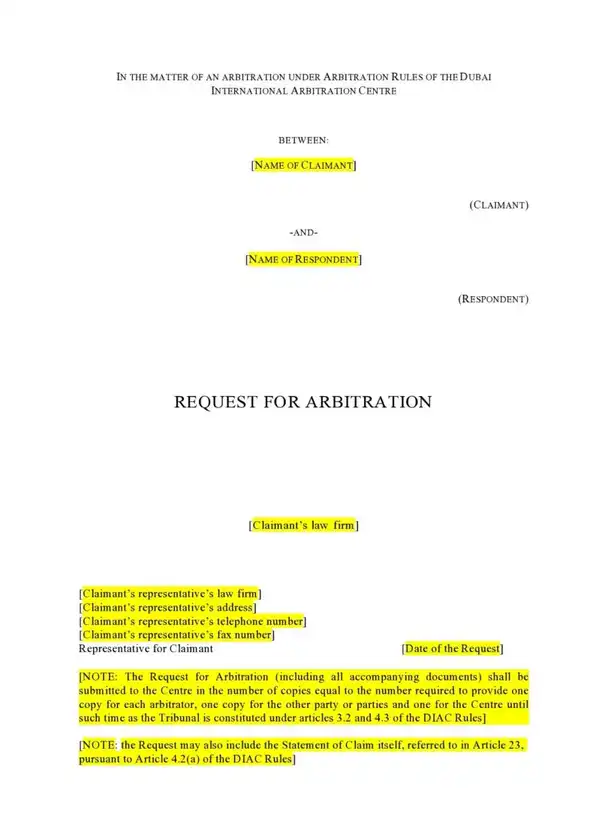
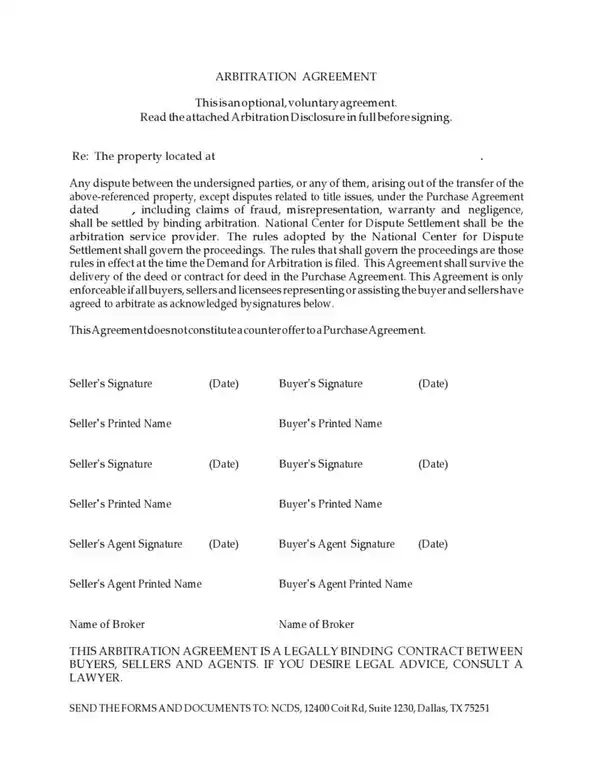
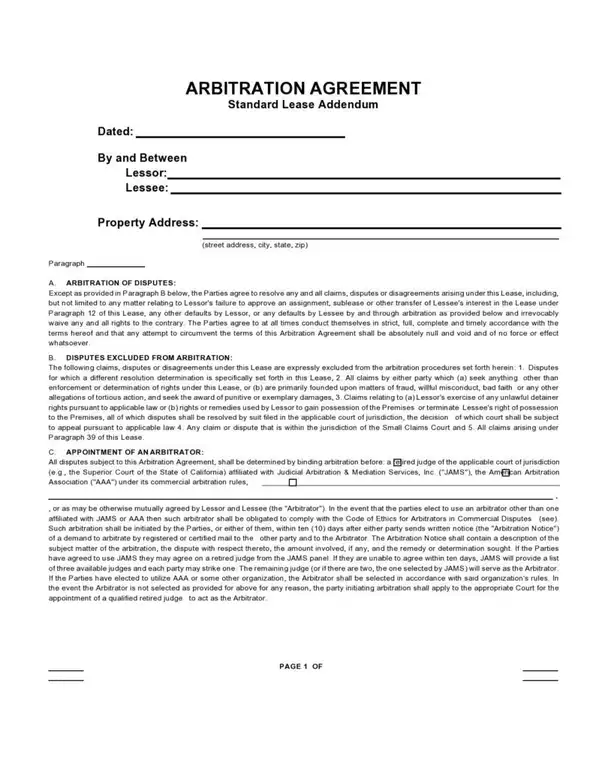
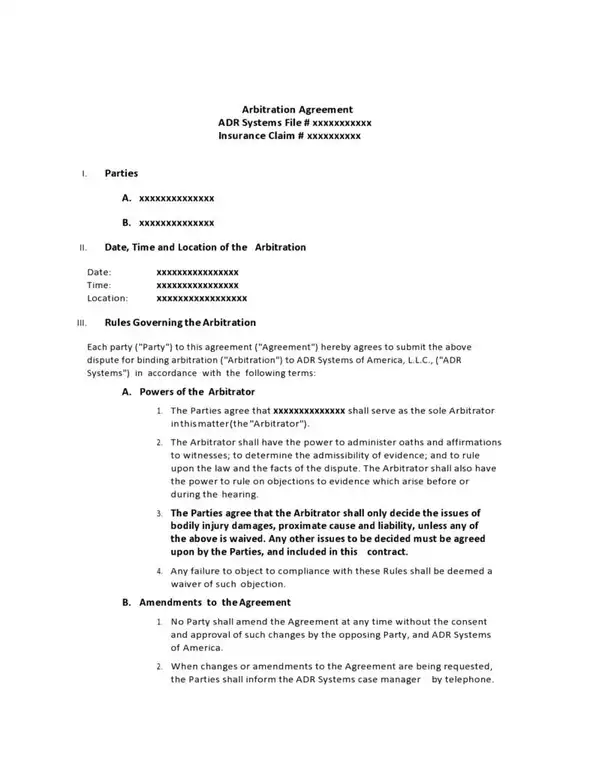
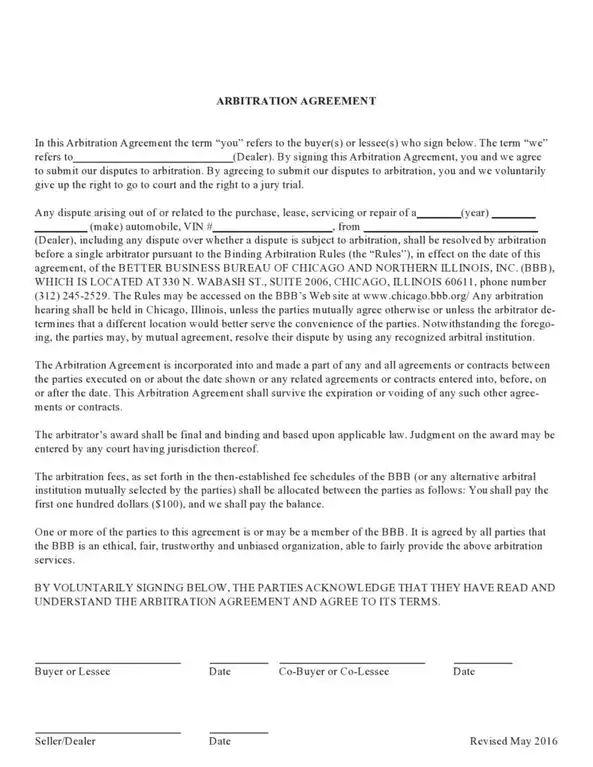
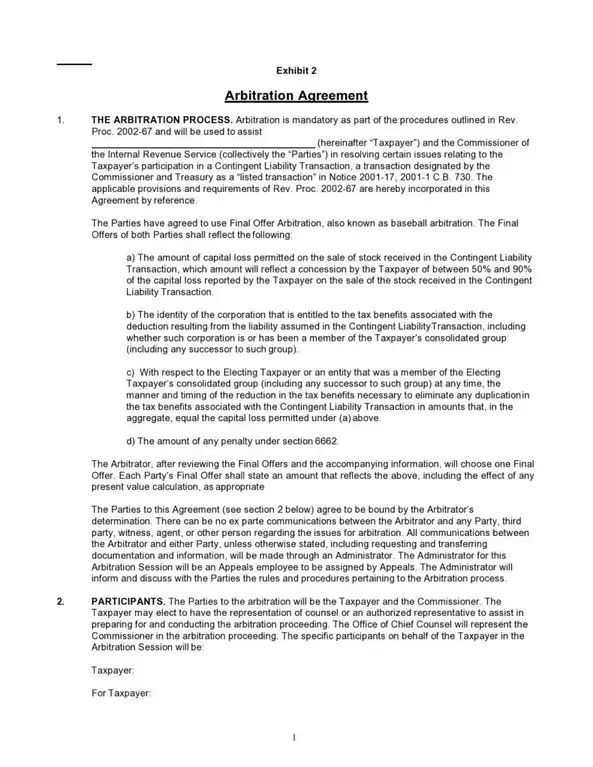
Common Mistakes and How to Avoid Them
People often make common mistakes when creating these agreements. Let’s examine these mistakes and learn how to avoid them.
Mistake 1: Vague Arbitration Clause
- Problem: The arbitration clause needs to be clarified about which disputes will be resolved through arbitration.
- Solution: Be specific. Clearly state which types of disputes will be resolved through arbitration. For example, “Any disputes about the terms of this contract will be resolved through arbitration.”
Mistake 2: Not Choosing a Method to Select the Arbitrator
- Problem: The agreement needs to explain how to choose an arbitrator.
- Solution: Include a clear method for selecting an arbitrator. For example, “The parties will mutually agree on an arbitrator. If they cannot agree, an arbitrator will be appointed by the American Arbitration Association.”
Mistake 3: Ignoring the Rules for Arbitration
- Problem: The agreement does not set the rules for how arbitration will be conducted.
- Solution: Specify the rules that will govern the arbitration. You can refer to existing rules from an arbitration organization or create your own rules. For example, “The arbitration will follow the rules of the American Arbitration Association.”
Mistake 4: Not Deciding the Location and Language
- Problem: The agreement needs to state where the arbitration will take place or what language will be used.
- Solution: Clearly mention the location and language. For example, “The arbitration will take place in New York City and will be conducted in English.”
Mistake 5: Overlooking Confidentiality
- Problem: The agreement does not include a confidentiality clause.
- Solution: Add a clause to keep the arbitration process private. For example, “All arbitration proceedings and the final decision will be confidential and not disclosed to any third party.”
Mistake 6: Not Addressing Costs and Fees
- Problem: The agreement needs to explain who will pay for the arbitration.
- Solution: Clearly state how the costs and fees will be shared. For example, “The costs of arbitration, including the arbitrator’s fees, will be shared equally by both parties.”
Mistake 7: Failing to Make the Decision Binding
- Problem: The agreement does not make the arbitrator’s decision final and binding.
- Solution: Include a clause that makes the decision final and binding. For example, “The arbitrator’s decision will be final and binding on both parties.”
By avoiding these common mistakes, parties can create clear and effective arbitration agreements.
In summary, arbitration agreements are very important in solving disputes today. They offer a good alternative to going to court. By knowing their benefits and limits, people can decide if they want to add arbitration clauses to their contracts. Arbitration is a structured, efficient, and private way to resolve disputes, making it a good choice for many people. By including all necessary terms and understanding the process, parties can effectively use arbitration agreements.

The content creator team at calipsotree.com is dedicated to making topics accessible to everyone, with over 9 years of experience in writing and breaking down complex concepts into easy-to-understand articles that answer readers’ financial questions.






